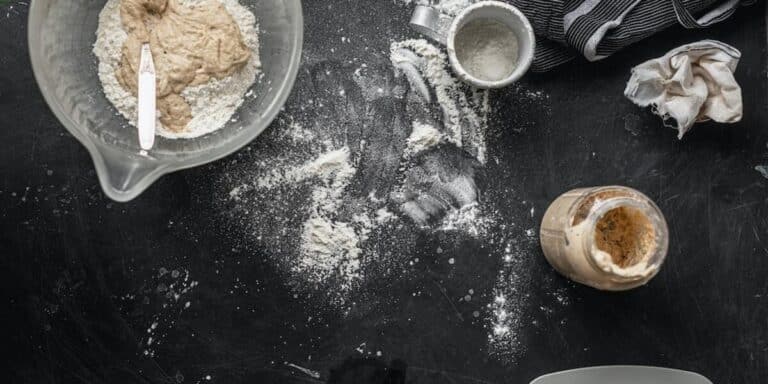What Is Kosher Salt?
You’ve probably seen kosher salt in recipes or on store shelves, but what exactly is it? It’s a type of salt that’s coarser than table salt and doesn’t contain additives like iodine. This gives it a milder flavor and a distinctive texture. But where did kosher salt come from, and how is it made? The answer lies in its origins and production process, which sets it apart from other types of salt. Let’s explore what makes kosher salt unique and why it’s become a staple in many kitchens – you might be surprised by its history and uses.
Key Takeaways
• Kosher salt is a type of salt with a coarser texture than table salt, making it easier to sprinkle and distribute evenly.
• Its larger crystals help draw out moisture and prevent bacterial growth in meat, making it ideal for curing and preserving.
• Kosher salt is often described as milder and less bitter than table salt due to the absence of additives like iodine.
• The crystal size and texture of kosher salt can vary depending on the manufacturer and production process.
• Kosher salt is made through evaporation or the Akala process, with some manufacturers using advanced methods to crystallize sodium chloride for better taste.
What Does Kosher Mean
When you see the word ‘kosher’ in the context of salt, it doesn’t actually refer to whether the salt meets Jewish dietary laws. Instead, it’s a term that’s been adopted to describe a specific type of salt that’s used in the curing process of meats. You might be wondering what makes kosher salt special, and the answer lies in its texture and composition.
Kosher salt is made up of larger, coarser crystals than regular table salt, which makes it easier to sprinkle and distribute evenly over food. This is particularly important when curing meats, as it helps to draw out moisture and prevent bacterial growth. The larger crystals also make it easier to rinse off excess salt, which is important when you’re trying to achieve a delicate balance of flavors.
In terms of taste, kosher salt is often described as milder and less bitter than table salt. This is because it doesn’t contain additives like iodine, which can give salt a harsher flavor. When you use kosher salt in cooking, you’ll often find that it enhances the natural flavors of your ingredients without overpowering them. Overall, kosher salt is a versatile ingredient that’s worth having in your pantry, even if you’re not planning on curing any meats anytime soon. Its unique texture and mild flavor make it a great addition to many different types of dishes.
Origins of Kosher Salt
Now that you know what makes kosher salt special, when it comes to its history, you’ll find that its origins are closely tied to the process of koshering meat, from which it gets its name. Koshering meat involves removing blood and other impurities from the meat, and salt plays a pivotal role in this process. The use of kosher salt in koshering meat dates back to ancient times, and it’s believed to have originated in the Jewish community.
Kosher salt was preferred for koshering meat because of its unique characteristics.
- Coarser texture: Kosher salt has a coarser texture than other types of salt, which makes it easier to sprinkle and remove from the meat.
- Absorptive properties: Kosher salt is highly absorptive, which helps to draw out blood and other impurities from the meat.
- Mild flavor: Kosher salt has a mild flavor, which doesn’t affect the taste of the meat.
The use of kosher salt in koshering meat led to its wider adoption in cooking and food preservation. Its unique characteristics made it a popular choice among chefs and cooks, who appreciate its versatility and effectiveness. Today, kosher salt is used in many different types of cuisine, from traditional Jewish dishes to modern fusion cooking.
Types of Kosher Salt
Now that you know the origins of kosher salt, you’re probably wondering what sets different types apart. You’ll notice that kosher salts can vary markedly with regard to texture and grain size, which affects how they dissolve and interact with food. As you explore the world of kosher salt, you’ll also discover differences in refining processes, which can impact the final product’s purity and flavor.
Texture and Grain Size
The texture and grain size of kosher salt vary noticeably across different types, which you’ll notice affects how it dissolves and interacts with food. You might be wondering why this matters – it’s actually quite significant. The texture of kosher salt impacts how it’s used in cooking. For instance, a finer grain dissolves more quickly, making it ideal for baking and sauces. On the other hand, a coarser grain is better suited for curing and preserving.
A few things to take into account about the texture and grain size of kosher salt:
- Finer grains are best for dishes where you want the salt to dissolve quickly, like in sauces and braising liquids.
- Coarser grains are ideal for curing and preserving, as they draw out moisture more effectively.
- Crystal size can also impact flavor – larger crystals have a more complex, nuanced flavor profile.
Refining Process Details
How does the refining process impact the final product of kosher salt, and what are the differences between various types, such as Diamond Crystal, Morton, and others? You’ll find that the refining process plays a significant role in the final product’s texture, taste, and even mineral content. Kosher salt is usually made through evaporation or the Akala process, which affects crystal size and shape. Depending on the manufacturer, these processes can be different. For example, Diamond Crystal kosher salt uses an advanced method to crystallize sodium chloride in an aluum that removes impurities for better taste. Its coarser crystal grains may differ slightly in their exact dissolution pattern in various cuisines and moisture. Compared, Morton uses more dense salts made with anti-ccaling agents.
Kosher salt usually possesses much lower impurity contamination chances when manufactured and often maintains cleaner manufacturing, too often depending less upon high-pressure solutions than in older standard refining equipment methods to control manufacturing speed with varying efficiency under controlled manufacturing circumstances generally required with differing and standard mining or pumping procedures necessary prior mining kosher and necessary pumping with mining in use now kosher with required water today too often made salt pans necessary required used or needed refining to extract common additional chemical.
How Kosher Salt Is Mined
Mined from underground deposits, kosher salt is often extracted through a process known as room and pillar mining, where large, underground caverns are created to access the salt deposits. You might be surprised to learn that these caverns can be hundreds of feet tall and wide, and stretch for miles. To extract the salt, you’d use heavy machinery to undercut the salt deposit, creating a sort of ‘room’ that’s supported by large pillars of salt. These pillars help keep the mine stable and prevent it from collapsing.
As you dig deeper into the mining process, you’ll find that there are a few key things that are important to take into account:
- Safety: Mining can be a hazardous process, and mine operators need to take steps to guarantee that workers are safe and healthy. This includes providing proper ventilation, maintaining equipment, and following safety protocols.
- Environmental impact: Mining can also have an impact on the environment, particularly if not done properly. Mine operators need to take steps to minimize this impact, such as restoring land after mining is complete and preventing water pollution.
- Salt quality: Finally, you want to make sure that the salt being extracted is of high quality and suitable for use as kosher salt. This involves monitoring the salt’s texture, taste, and purity to guarantee it meets the necessary standards. By taking these factors into consideration, you can understand the process of mining kosher salt in a more nuanced way.
Refining Process Differences
Once kosher salt is extracted from the earth, you’ll need to refine it, and that’s where differences in the refining process can affect the final product’s quality and texture. You see, kosher salt’s refining process typically involves fewer steps and less processing than other types of salt. The extracted salt is usually crushed or ground into smaller crystals, and then any remaining impurities are removed through a series of filters or centrifuges.
As you refine kosher salt, you might notice that different manufacturers use slightly different techniques. Some may use a more traditional, manual process to remove impurities, while others might rely on modern machinery and automation. These differences can impact the final product’s texture and flavor. For example, a more manual process might result in a slightly coarser or more irregular crystal shape, which can affect the way the salt dissolves and distributes its flavor.
It’s worth noting that some kosher salt producers also choose to add anti-caking agents to their product. These agents prevent the salt from clumping or becoming lumpy over time, which can make it easier to sprinkle or pour. However, not all producers add these agents, and some cooks might prefer to avoid them altogether. As you shop for kosher salt, you’ll want to check the ingredients or manufacturer’s notes to see if anti-caking agents are used. This will help you make informed decisions about the type of kosher salt that best suits your needs.
Kosher Salt Vs Table Salt
When it comes to comparing kosher salt with table salt, you’ll notice a few distinct differences regarding crystal size, texture, and overall taste. You’re probably wondering what sets these two types of salt apart. Let’s plunge into the details.
First off, the production process differs markedly. Kosher salt is made using a traditional method known as raking, where the crystals are raked from the surface of evaporation pools. In contrast, table salt is produced through a vacuum refining process, which removes impurities and additives. This disparity in production affects the final product’s texture and composition.
Kosher salt has a coarser crystal size, which makes it easier to sprinkle and use as a finishing salt. Table salt, on the other hand, is finer and more prone to clumping.
Kosher salt typically contains fewer additives than table salt. While table salt often contains iodine and anti-caking agents to improve flow and prevent goiter, kosher salt is generally free of additives.
Kosher salt has a milder flavor, whereas table salt can have a bitter or metallic taste due to the refining process.
As you can see, the differences between kosher salt and table salt are more than just a matter of name or packaging. The distinct production processes and resulting characteristics set these two types of salt apart, making them suited for different uses in the kitchen.
Flavor Profile and Texture
Kosher salt’s unique flavor profile and texture are shaped by its larger crystal size, which you’ll notice the moment you sprinkle it onto your food. The bigger crystals have a milder, less bitter taste compared to table salt, and they also dissolve more slowly on your tongue. This slower dissolution gives kosher salt a more subtle, nuanced flavor that won’t overpower the taste of your dishes.
As you sprinkle kosher salt, you’ll also notice its distinctive texture. The larger crystals have a coarser, more irregular shape than table salt, which gives them a crunchier feel when you bite into them or crush them between your fingers. This texture can add a pleasing sensory element to your meals, especially when you use kosher salt as a finishing salt to add a final burst of flavor and texture just before serving.
It’s worth noting that kosher salt’s flavor profile can vary slightly depending on the specific type and brand you use. Some kosher salts may have a slightly sweeter or more mineral-rich flavor than others, while some may have a more neutral taste. However, in general, kosher salt’s larger crystal size and milder flavor make it a popular choice among chefs and home cooks who want to add depth and complexity to their dishes without overpowering them with too much salt.
Uses in Cooking and Baking
As you start exploring the various uses of kosher salt in cooking and baking, you’ll discover how it can heighten the flavours of your dishes. You’ll learn how kosher salt augments flavour profiles and how it compares to other types of salt from the perspective of measurement and substitution. With this knowledge, you’ll be able to reveal the full potential of kosher salt in your recipes.
Enhancing Flavor Profiles
You’ll often reach for kosher salt to enhance flavor profiles in various dishes, from savory meats and soups to baked goods and desserts, because of its coarser crystals and milder flavor. When you use kosher salt, you can bring out the natural flavors of the ingredients without overpowering them. This is particularly useful in dishes where you want to add depth without making them taste salty.
Here are some ways kosher salt enhances flavor profiles:
- Balancing sweetness: Kosher salt’s mild flavor helps balance the sweetness in baked goods, desserts, and sweet sauces, creating a more rounded taste experience.
- Enhancing umami flavor: Kosher salt brings out the umami flavor in foods, which is often described as savory, meaty, or brothy, making dishes like soups, stews, and braises more complex and satisfying.
- Complementing acidity: Kosher salt complements acidic ingredients like citrus juice or vinegar, creating a harmonious balance of flavors that enhances the overall taste experience.
Measuring and Substitution
When substituting kosher salt for other types of salt, it’s essential to adjust the measurement, as the coarser crystals of kosher salt take up more space than finer salts. You’ll need to use about 1.5 times more kosher salt than table salt or fine sea salt. For example, if a recipe calls for 1 teaspoon of table salt, you’ll need about 1.5 teaspoons of kosher salt.
In terms of measuring kosher salt, you can use a digital kitchen scale to get accurate measurements in grams or ounces. When using volume measurements, keep in mind that kosher salt can compact over time, so gently fluff the salt in the container before scooping. When substituting kosher salt in recipes, taste as you go and adjust the seasoning accordingly. Over-salting can easily happen, and it’s easier to add more salt than to remove excess. Remember that kosher salt dissolves more slowly, which can impact the final flavor profile. With practice, you’ll become more comfortable with substituting kosher salt and develop a sense of how it enhances the flavors in your cooking and baking.
Health Benefits and Risks
Generally, consuming kosher salt in moderation doesn’t pose significant health risks, but excessive intake can lead to conditions like hypertension and cardiovascular disease. You should be aware of the potential risks and benefits associated with kosher salt consumption.
When you consume kosher salt in moderation, it can help maintain fluid balance in your body, regulate nerve and muscle function, and support bone health. However, excessive intake can lead to an overload of sodium in your system, causing high blood pressure, heart disease, and stroke.
Some key points when it comes to kosher salt and your health:
- Kosher salt is still high in sodium: While it may be less processed than table salt, kosher salt is still high in sodium and can contribute to excessive intake if not consumed with restraint.
- Mineral content is not a significant factor: Although kosher salt may contain some minerals like iron and calcium, the amounts are not substantial enough to provide considerable health benefits.
- Individual needs vary: If you have specific health conditions or concerns, your doctor or a registered dietitian can help you determine a safe and healthy level of kosher salt consumption.
To enjoy the benefits of kosher salt while minimizing the risks, being mindful of your overall sodium intake and balancing it with a healthy, varied diet is crucial.
Storing Kosher Salt Properly
Now that you’re aware of the health implications of kosher salt, it’s time to contemplate how you store it to preserve its texture and prevent it from becoming clumpy or contaminated. You’ll want to guarantee it in an airtight container to protect it from moisture and other environmental factors. A glass jar with a tight-fitting lid is an excellent option, as it won’t impart any flavors or odors to the salt.
When storing kosher salt, you should also consider the location. A cool, dry place like a pantry or cupboard is ideal. Avoid storing it near a stove, oven, or dishwasher, as the heat and moisture from these appliances can cause the salt to become clumpy or cakey. You should also keep it away from direct sunlight, which can cause the salt to degrade over time.
It’s also important to use a clean scoop or spoon when dispensing kosher salt to prevent contamination. If you’re using a salt cellar or shaker, make sure to clean it regularly to prevent the buildup of bacteria or other microorganisms. By following these simple storage tips, you can help preserve the texture and quality of your kosher salt and guarantee it remains a staple in your kitchen for months to come.
Frequently Asked Questions
Is Kosher Salt Suitable for Consumers Following a Vegetarian or Vegan Diet?
You’re wondering if kosher salt is suitable for a vegetarian or vegan diet. You’ll be relieved to know it is, as it’s derived from natural salt deposits and doesn’t involve animal products in its processing.
Can Kosher Salt Be Used in a Salt Grinder or Mill?
You can use kosher salt in a salt grinder or mill, but it’s not the best choice. Kosher salt’s coarser crystals can clog your grinder, so you’ll want to choose a finer-grained salt for better results.
Does Kosher Salt Contain Iodine Like Table Salt?
"You’re sprinkling a pinch of curiosity into the air, wondering if kosher salt contains iodine like table salt. The answer’s no, it doesn’t; kosher salt’s a natural, unrefined salt, free from additives like iodine."
Is Kosher Salt More Expensive Than Regular Table Salt?
You’re wondering if kosher salt is pricier than regular table salt. Generally, kosher salt can be more expensive due to its coarser crystals and traditional harvesting process, but prices vary depending on the brand and quality.
Can I Substitute Kosher Salt With Sea Salt in Recipes?
You can substitute kosher salt with sea salt in recipes, but keep in mind that sea salt has a coarser texture and a more distinct flavor, so you may need to adjust the amount used.





